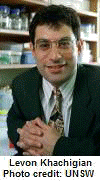 UNSW's
Levon Khachigian Awarded 2004
Australasian Science Prize. (November
17, 2004)
UNSW's
Levon Khachigian Awarded 2004
Australasian Science Prize. (November
17, 2004)
|
News & Views item - November 2004 |
![]()
 UNSW's
Levon Khachigian Awarded 2004
Australasian Science Prize. (November
17, 2004)
UNSW's
Levon Khachigian Awarded 2004
Australasian Science Prize. (November
17, 2004)
Professor Levon Khachigian, a Senior Principal NHMRC Research Fellow and Head of the Transcription and Gene Targeting Laboratory of the Centre for Vascular Research at the University of NSW was yesterday the recipient of the Magazine Australasian Science's 2004 Prize. This marks the second year in a row the prize has been awarded to a University of New South Wales Researcher (Mark Rowe won it last year for determining how sensations are processed and transmitted in mammalian brains).
Professor Khachigian's team of fifteen researchers are working to develop novel
treatments for arterial diseases, including several aggressive cancers, based on
innovative ways for identifying genes that damage blood vessels. As Peter
Pockley reports in the Nov/Dec issue of Australasian Science, "The most
recent finding by... Levon Khachigian and his colleagues is of molecular tools that block the growth of aggressive melanoma in mice. By
suppressing the action of a gene, c-Jun, they have prevented the
formation of the new blood vessels that cancer cells require to survive and
proliferate."
is of molecular tools that block the growth of aggressive melanoma in mice. By
suppressing the action of a gene, c-Jun, they have prevented the
formation of the new blood vessels that cancer cells require to survive and
proliferate."
In summarising the work of his group Professor Khachigian says, "I think that
one of our strengths is our ability to translate fundamental observations into
potential therapeutic strategies; we like to think of inventive ways to
interfere with key molecules and the cellular events that would otherwise lead
to the manifestation of disease," and in accepting the award he said, that
without significant additional research funding, "we risk losing the opportunity
of capturing and building upon the people, project and infrastructure
investments already made. Our competitive position as an international player in
research is squarely dependent on adequate government funding."
And Professor Khachigian added simply, "Fundamental understanding is critical to any area of research, which is why we need to support curiosity-driven research."